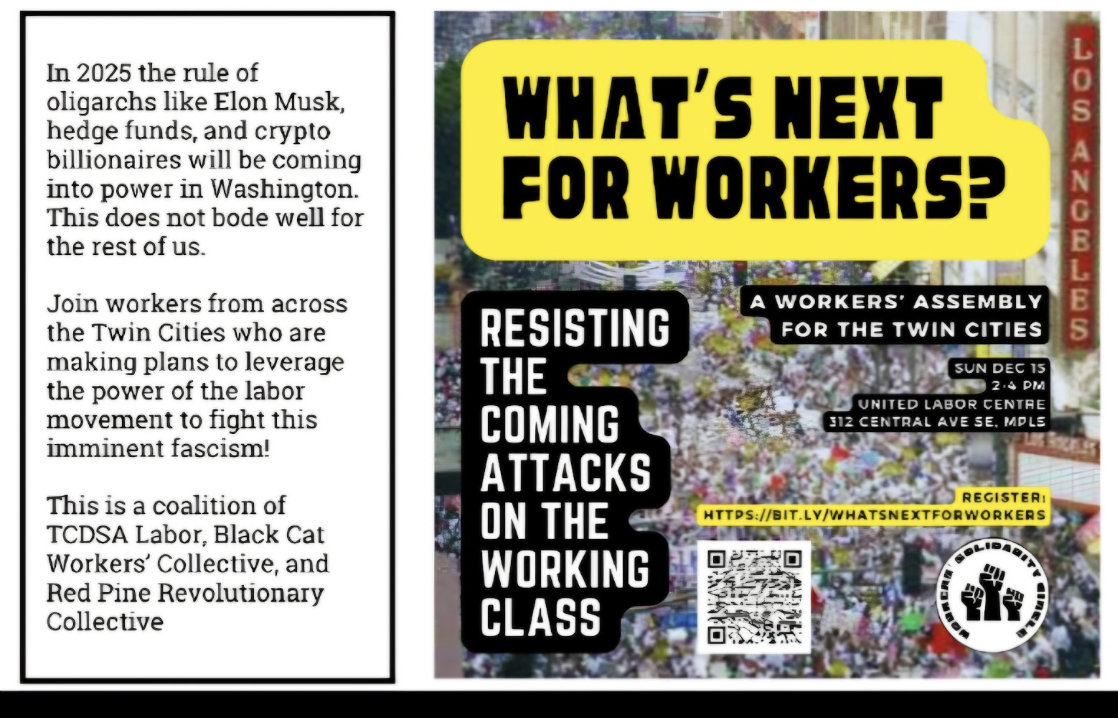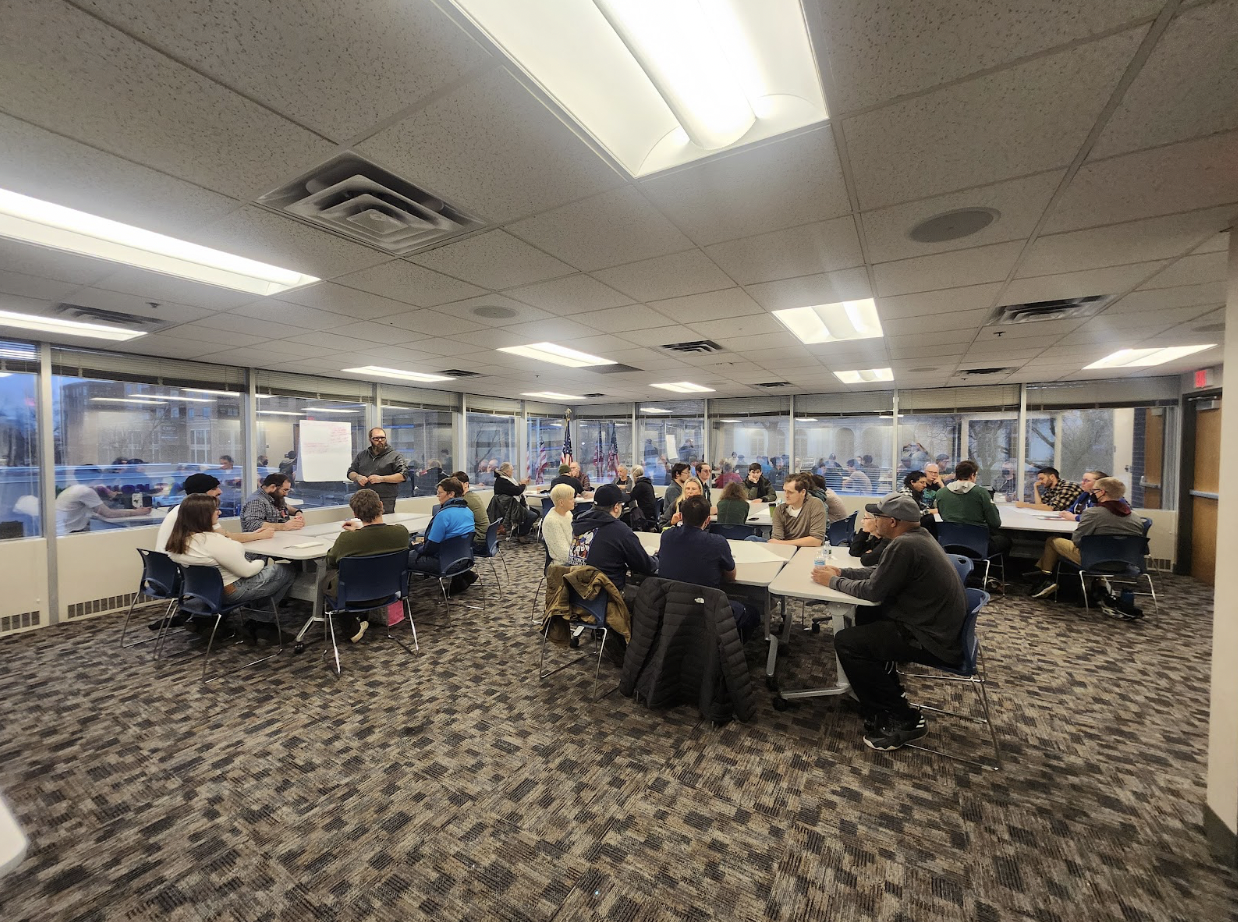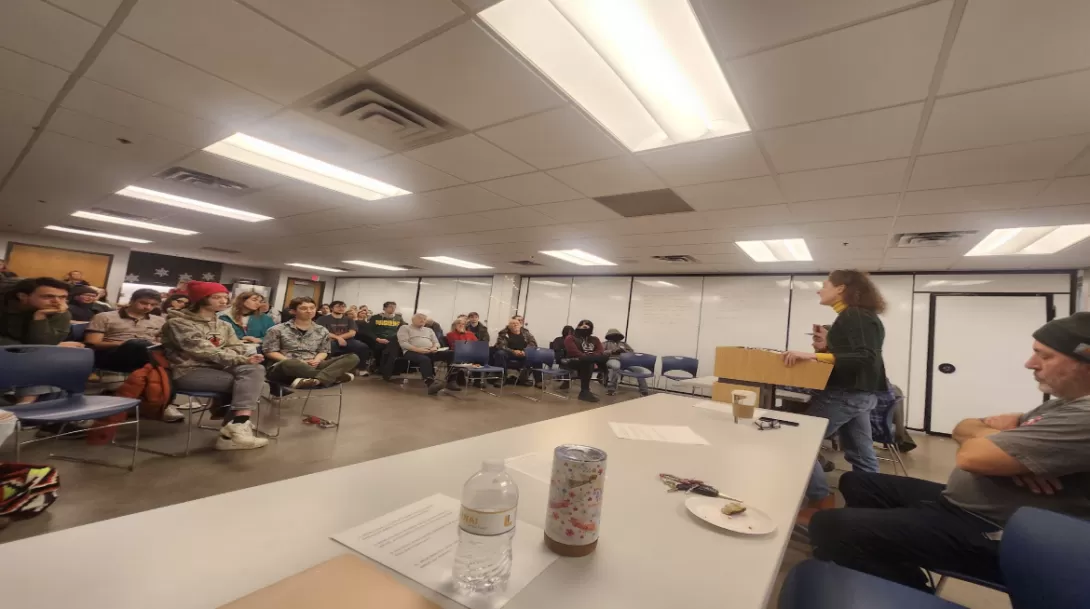On Sunday, December 15th Black Cat Workers’ Collective (BCWC) and our partners in the Workers Solidarity Circle (WSC) coalition put on our first Workers’ Assembly. The WSC is made up of BCWC, the Democratic Socialists of America (DSA) Labor Branch and Red Pine Revolutionary Collective (RPRC).
With the feelings of fear and helplessness many workers are feeling in the wake of Trump’s reelection, the focus of our first workers’ assembly was clear: What’s next for workers? Members of multiple unions were in attendance - UNITE HERE, CWA, SEIU, MFT, MAPE, UDAM, NALC, SPFE, MNA, UFCW, the Carpenters, along with those from several unionizing campaigns. Workers without union affiliation were also in attendance.
Our assembly started with speakers - including Jessica Garraway of MFT and Black Cat, Cliff Harper of Red Pine and UNITE HERE, Kip Hedges of DSA and the Delta unionization campaign, and Ali Fuhrman of AFSCME. Facilitating the event was Kieran Knutson of Black Cat and the CWA. 
When the panel of speakers concluded, the crowd of over 70 broke into 9 small groups addressing the questions of the hour. Why did Trump win? What attacks can people expect to see on working class people? What can a fighting labor movement do in response?
Workers in attendance attributed Trump’s victory to several factors. A major one was the incompetence of the Democratic Party’s campaign, which took the support of working people and marginalized communities for granted. Trump’s relatability and populist appeal was another factor, as was growing sexist, racist, transphobic and anti-immigrant sentiment in the working class. Another key point made was that demographics that usually could be counted on to vote Democrat - such as folks of color - are moving to the right. The genocide of the Palestinian people was pointed out as another major source of disillusionment of the Democratic Party’s traditional base, causing many progressives to stay home on election day. There was clear consensus that the lack of parties or candidates representing workers’ and marginalized people’s interests meant a victory for Trump, with less than 50% of the population voting for him. With only a lesser evil to choose from, our interests are currently simply not on the ballot in our electoral system. Instead, we have had to make our political will known through mass movements and direct action.
Small groups next discussed many of the attacks they expected against the working class, with the then-incoming Trump administration. Since the assembly, many of these predictions have come to pass. Workers at the assembly warned of attacks on immigrants, including mass deportations; restrictions on abortion access; the tearing down of trans rights; moves to bust unions; attacks on the right to dissent; assaults on nonprofits, educators, and healthcare; and total disregard for the environment. These have all emerged as hallmarks of this administration over the past two short months.

Our final question focused on what would be most helpful to workers from a fighting labor movement in the midst of all these attacks. There was robust conversation with many perspectives and thoughts given. Several points were made repeatedly by workers in attendance.
Workers at the assembly called for the mobilization of support for each other's workplace struggles, and the building of a culture of solidarity and mutual support. Organizing the unorganized was also a big topic of discussion. Folks spoke to the importance of shop-floor direct action, especially as legalistic routes for handling grievances are stripped away from us. In line with building fighting unions, people spoke to the importance of democratizing our unions and supporting rank-and-file power within them. Others added that as we build rank-and-file controlled, militant unions, we need also to be willing to fight things that go beyond immediate bread and butter issues (such as wages and benefits). People spoke in favor of bargaining for the common good and making demands not only as workers of one industry, but as a class - for example, by including action on affordable housing or clean air and water in unions’ demands.
Workers further spoke to the importance of building stronger education and communication for our movements. They called for political education, as well as education in skills useful to our struggles - in media, legal defense, and workplace and community organizing. People identified the need for stronger outreach through our own media, and social media, which has been so effectively used by conservative and reactionary forces. Assembly attendees also urged each other not to forget the role of art and community in building a culture of solidarity. Our outreach, attendees noted, should expand beyond the usual circles where liberal and left-wing ideas are popular - beyond activist and subcultural spaces - and speak to the broader community. It is especially important to organize alongside, as, and in solidarity with, the immigrant community and workers in other countries.
In recognition of the threat posed by Trump’s administration, several people spoke of the need for a struggle against fascism and for cooperation and solidarity in the face of the authoritarian threat. The past weeks of Trump’s second term have underlined the importance of that goal.
These observations at the Workers’ Assembly have informed the organizing of the Workers Solidarity Circle, and Black Cat Workers’ Collective, going forward. Our members are rank-and-file union activists, organizing hard to build a practice of direct action, union democracy, and solidarity between unions and social struggles - whether that be building solidarity with Palestine among educators or opposition to prison slavery among construction workers. In the weeks since the assembly, we have also been hard at work building our media, including Wildcat!, and our social media outreach, while some of our members are heavily involved in the new wave of protest music arising from this moment of resistance. Other members of our coalition have been active in preparing community self-defense.
Workers Solidarity Circle will be holding another Workers’ Assembly, on Sunday March 23rd, from 2-4 PM at the United Labor Center, at 312 Central Ave SE Minneapolis. The topic will be “Resist ICE.”
It is our understanding that the workers’ assemblies provide not only a valuable space for workers to think through, process, and plan responses to the concerns we face, but also prefigure the kind of democratic institutions the labor movement needs on a mass scale. By doing so, we actualize a society where workers aren't just treated nicer or paid more, but where we are the shapers of and main decision-makers inthe very society our labor is crucial in maintaining. The world we are fighting for - the world we deserve- is one of democratically run workplaces and communities, of autonomy and solidarity. We should demand nothing less.


Comments